- Home
- Robin McKinley
The Outlaws of Sherwood Page 5
The Outlaws of Sherwood Read online
Page 5
As folk arrived after leaving their old homes for the last time, they brought bits of their lives with them; but few had more than bits to bring. Humphrey brought three good bows and the seasoned wood for four more; and the gear to make several dozen arrows. “Call it a dowry,” said Humphrey with a grin half-sheepish and half-proud. “Old Alcock’s been drunk for years,” he said; “he’ll never notice they’re gone. And if my lord does, it’ll be too late to guess the truth and Alcock will have to think up a good tale quick to save his own skin—which if you want to ask me he should have lost long ago.”
Now, how many among us can shoot what they aim at? thought Robin. About as many as can be sure of the north side of a tree. “Very well done,” he said aloud; “and the sooner you get those arrows fletched, the better. You couldn’t have chosen anything we needed more.”
But the first night that he was not alone in the little half-hut, half-cave he could not sleep, listening to the breathing of the other human beings who now shared his outcast condition. He still could not quite believe that anyone would willingly throw over a living, however meager, to live as an outlaw. “Ah, but Robin, that’s just it: we are choosing,” said Much, when Robin admitted a little of this to him. He looked at his friend a time, finding, Robin suspected, new circles under the eyes and lines in the forehead. “None of us wakes in the night speaking the name of the man he killed by accident,” he added.
Everyone was too tired come nightfall for many second thoughts. With the basic requirements of survival to attend to, which were daily urgent enough, Robin compelled—or was compelled to compel—practice sessions in woodscraft and archery. “If we had a smith among us, perhaps it would have been swords, but it is just as well it is not, because I know nothing of swords except that you should hold on by the end that isn’t sharp. And we cannot afford to let anyone live among us who cannot sometimes bring home meat to feed us.” Humphrey was a decent archer, about even with Robin himself; and Rafe, again, learned quickly. These two and Much he took aside and had practise further, with his father’s longbow. “You must be mad,” said Much, when he drew it the first time; “Good God,” said Humphrey when he did. Rafe lost hold of the string altogether and put his wounded fingers in his mouth without saying anything.
“It is not possible to be accurate with anything so big and stiff,” said Much,
“It is,” said Robin; “my father did it. We have need of some edge over those who would pursue us. I have it in my mind that the longbow shall be that edge; it is little enough. I know something of bow-making; you and I, Humphrey, must see what we can do.”
Humphrey looked thoughtful. “I might make another visit to Alcock’s armoury after all. There are untrimmed lengths that might answer, or discarded ones that no one has looked at closely.”
“Let us wait on that till we hear if there is any gossip about the six strong men who bound the heroic Alcock hand and foot and stole his twenty best bows from under his helpless eyes,” said Robin. “There are other armouries and other bow-makers.”
“To what purpose?” said Much. “Your father was an extraordinary man; we’re all superlatively ordinary. Even if we could learn to draw such a thing as this longbow of yours, we are supposed to be woodsmen, are we not? We’ll be whacking the ends of our bows off at every tree.”
“The bow will be the size of the man,” said Robin, “no more.”
Much sighed. “Then I am the wrong one to complain, I guess, as mine will be the shortest in the company.”
Marian, when she heard, liked the idea. “I have heard that the Welsh have been using longer bows than ours for some time; and they are not a tall people. May I try?” Robin handed her the longbow; she pulled it, but her eyes widened. “Ouch,” she said. “I will have to begin carrying a wolfhound under each arm at home to develop my strength.”
Exhaustion at day’s end did provide a thankfully dreamless sleep for most of the little band. Robin, who dreamed more than the others, had something else to be grateful for: a marked lack of philosophy. Robin was much better at choosing hidden spots for secret meetings than he was at getting through the meetings themselves; no longer at the miller’s clean hearth, he drew plans for huts and trenches in the dirt with a stick while the conversation went on without him. He did not wish to be either a king or a king-maker, and did not see that kings or philosophies kept the rain out. He said this latter so often that Much threatened to carve it in wood and hang it around his neck on a thong. Much missed the tale- and future-glory-spinning by an evening fireside; since he had left the mill for Sherwood, he spent his days doing the work of two or three people and therefore was one of the first to fall asleep at night. But Robin was happiest building huts and digging trenches, and it was hut-building and trench-digging that were important now.
The passing months were hard ones and grew no more easy; for as the green young outlaws grew a little older in skill and experience, the tale of their existence gained momentum. The tale had been launched by the sheriff’s reward for the taking of Tom Moody’s murderer, and it had lost nothing in the telling as the first weeks passed and the murderer was not taken. If Robin had not gathered a band of outlaws around him, the tale-tellers would have had to invent one for him. But the band did exist, and none of its members was taken either—the tale-tellers did not have to know how close one or two of Robin’s dumber and more eager folk occasionally came—and this, too, improved in the retelling. There had been outlaws around Nottingham and in Sherwood before, but this sounded like something new—outlaws who believed in king and country, and good English law; who merely rebelled against the heavy hand of tyranny. The outer reaches of Sherwood became positively thick with people who, for practical or impractical reasons, wished to find these honourable outlaws; and some of them, too many from Robin’s perspective, penetrated deep into the forest whose vastness was to be his and his people’s security. The foresters and sheriff’s men were avoided. If they were a dangerous problem, at least they were a straightforward one.
But other men came too, and a few grim and weary women, to seek just that haven that the tale-tellers had made of Sherwood and of Robin. And they were a much more complicated problem. The first few self-chosen outlaws were all Much’s friends; their loyalty to Much’s cause was not questioned, only their adaptability to the hard facts of their new life. The folk who came searching for Robin now were unknown. But their usual method of search was merely to plunge as far into Sherwood as they could get and then, completely lost, to wait hopefully to be rescued by the intrepid new scourge of Norman corruption. Robin could not ignore them, for it was on his head as certainly as the sheriff’s reward that they were there at all. And so they were rescued and brought, if not to the home camp, at least somewhere that they might meet a slightly-built, ordinary-looking young man who spoke to them courteously. They tended to be surprised when Robin introduced himself. Some realised, or were persuaded to realise, that life as an outlaw was not the answer to their troubles. Some stayed.
The ones who did not stay were led back to one of the public ways through Sherwood, and given enough food to see them to the nearest town—and sometimes a coin, even if only a farthing. Much observed the first act of alms-giving with an ironical eye; he himself had brought the outlaws’ first earnings back to Sherwood from the sale of some arrows Robin had made from the materials Humphrey had brought. The money was to have gone to buy more materials for more of those desperately-needed arrows to keep the outlaws fed. “I saw the extra loaf of bread in that parcel, too,” said Much. “Fortunately my snares are working nicely, and I also brought flour.”
Robin hunched up his shoulders and scowled. “The man had been wandering for days; you could see his ribs through his shirt. What would you have me do?”
“What you did,” said Much. “Didn’t I just say that my snares work nicely?”
Robin’s band had settled, more comfortably than might have been expected, into the little hillside glen with the stream and pool nearby. The hu
t-cave had been enlarged enough by the first half-dozen of them that it was possible to creep out in the middle of the night without necessarily treading on any of one’s fellows. The position of the boulder-fall had made it possible to build a semi-permanent hearth for a fire, which was protected from the worst weather, and which could be prevented, mostly, from smoking in too tell-tale a fashion; and which enabled them to eat cooked food. No one remembered when the camp began to be called Greentree. One day it was merely a patched-together and unreliable temporary shelter for folk who had no better; and the next day it had a name, and had become home.
Many of the king’s deer that Robin had once earned his bread to preserve went to feed the pinched bellies of his outlaws; and as anyone’s marksmanship improved, he began to learn to set his arrows where the beast was least likely to fall and break the shaft, that the arrow might be salvaged and used again. It occurred to Robin that it might be possible to grow tired of venison; but there were rabbits as well, and squirrels and pigeons, and several of the folk that now sheltered with him proved handy with roots and herbs, and the stews then produced became savoury as well as nourishing. Much brought flour from Whitestone as his father could spare it, so that they might also have bread and dumplings. The miller was well off as Saxon yeomen went, and could spare it, and so Robin tried not to think of the debt, only too likely to prove unpayable, that his company was running up to the miller’s generosity. It was a little easier not to think about when he looked around him at the wan discouraged faces filling out, and the wary glint of hope seen in more and more eyes.
“Any man may be called merely Robin,” grumbled Much one day; “we need a better name for you.”
“Normanslayer?” Robin suggested ironically. “Deerthief? Sheriff’s-bane?—would that I were.”
Much shook his head. “My second sister’s husband’s name is Robin, and a duller stick of a man you could not hope not to speak to.”
“Speaking well or ill does not keep the rain out,” said Robin automatically. “If he—”
“No,” said Much. “We all know by now about your single-minded lust for the practical. But word’s gone out, you know, just as we told you it would. Anyone we’d want who got you confused with my sister’s husband wouldn’t come, for fear of being bored to death. You need another name. Or we need something to call you.” Much brooded. “I rather like Sheriff’s-bane.”
“I do not,” said Robin. It was a grey and louring sort of day, and a damp, sticky drizzle fell or crept through the trees. Summer had arrived, and the woods were thick with the smell of it, and the rain was warm and felt almost like sap—no less unpleasant running down the back of the neck. Robin pulled his cloak up around his head. “Robin of the Hood,” he suggested. “It rains enough here, God knows.”
“It’ll do,” said Much. “I know you too well to expect better.” Marian came to the camp at least once a sennight. She was, if anything, even more tired than Robin himself, although he never asked her if her dreams woke her in the small hours. Nor did they ever discuss her coming to live in Sherwood as Much had done, who still went outside, when it suited him, as the miller’s son. But then his father was sympathetic to his son’s cause, and Marian’s, had he known of it, would not be. Marian continued to live at her father’s house, and she learnt what people said of the sheriff, and of the small band of unusual outlaws lately gathered in Sherwood; and she brought the tales with her as she brought leather and twine and salt and pots for cooking. It was a dangerous task she had set herself, and a dangerous journey, both for herself and for Robin and his people. The strain—beginning with the fact that Marian did not permit discussion of what it was she was doing—told on both her and Robin, and they quarrelled almost as often as they met.
It had been ten days since last she had been to Greentree, and not only had the company cautiously accepted two new members, but there were two families sitting in a subdued and worn little huddle near the fire. The small available space of the glen was bursting at the edges, and Robin was twitchier even than usual. There were too many people to keep utterly quiet, and he wanted any forester so implausibly scrupulous in pursuit of his occupation (or the price on Robin’s head) as to come anywhere near the camp to hear nothing more for his trouble than the sounds all trees make alone in a wilderness. “I did not think there would be so many,” said Marian wonderingly.
“Neither did I,” said Robin grimly. He had not had the heart to send the families immediately on their way, as he usually did with the clearly unsuitable. They had been wandering too long and were too weary; each had children who were wearier yet. They would be sent on—soon; but not till they were fed and rested, and meanwhile they had, somehow, to be taken care of till they had regained their strength.
Robin, looking at the faces around the fire, and then back at Marian’s, thought there was not much difference between them. Love and fear turned in his heart, and he could not have said which was stronger; but the two of them together produced a spark like anger. “You cannot keep on like this,” he said. “It is too hard for you. It is too hard for me, watching you.”
Marian sighed; she and Robin hadn’t had their quarrel yet this visit. She pulled herself to her feet. “I will go on like this because I am the best spy you have. I cannot trust the Norman gentry any less than you yourselves do,” and Robin saw the shadow of her father on her. “You need not fear that I will be followed; the sheriff’s men wonder, to be sure, and they watch me when they have a few minutes to spare; but they will not believe anything too mutinous of a mere daughter while the father still pays his taxes and salutes the sheriff in the streets of Nottingham. And I have taken care to be seen drooping and ashamed as persons of better judgement tell me what I might have expected of such a scurrilous friend as the son of old Robert Longbow. Robert was not a bad man, you know, but his son …” She looked at Robin and half-smiled. “I will try to bring more cloth the next time I come; you are still sadly ragged.”
“Robin keeps insisting on clothing the ones who need it worst first,” said Much. “I’ve told him that that colour really doesn’t suit him, but he won’t listen.”
Robin stood up beside Marian. “Truly you must not risk yourself this way. I know I say this to you every time, but I cannot help it. If anything should happen to you—”
She laid a hand gently on his lips. “Nothing will happen to me, barring an inconvenient tree limb falling on my head, or that Beatrix contrives to fall ill again. You have other, better things to concern yourself with.”
Robin smiled beneath her fingers, and took her hand in his own and kissed it. “No,” he said.
She held his hand a moment longer when he would have released hers. “Thank you,” she said, and then she turned and was silently gone. A baby cried, and Robin returned to his present responsibilities with a shudder. “A crying child’s voice will carry half across England. Is there still no news?”
Much shrugged. “I’m sure Jocelin is running his feet sore even now, but it’s only been three days, and it’s not so many towns that will take families who have so obviously run away from their last places—particularly farm families without town skills. It will take time.”
“Time which we will not have,” said Robin. “We must split the camp. If they are caught here, not only are our heads forfeit, but likely their own as well, for being found with us.”
Much nodded. “That’s true. There’s shelter at Growling Falls, and it’s an easy way from here, and we could still feed them and keep an eye on them.”
“There will be shelter, you mean,” said Robin. “We’ll start on the roof tomorrow.” The child wailed again, and Robin grimaced.
“Or perhaps tonight,” suggested Much. “There’s a good moon for it.”
It would be at least another day and more likely two before, in conscience, the families could be shifted to Growling Falls. In conscience? thought Robin. How does my conscience feel about not moving them? There was no news from Jocelin; the only news was of the s
heriff’s braggadocio, and how he would have Robin Hood’s head on a pike before the season was passed. Robin had spoken to the baby’s mother, but colic was colic; and even once they were resettled at Growling Falls they would eat as much as they did at Greentree, and how much they ate was—as people who have not had enough to eat for months will eat.
Not for the first time, it occurred to him that Much could run their company, particularly now that it was more or less going, now that there were at least three or four of them who could be trusted not to get lost, now that there were folk to hunt and dig and cook as well as plan. If he gave himself up into the hands of the sheriff’s men, much of the enthusiasm for tracking the others down would evaporate, and they might not be in much danger. He knew however that he was not capable of giving himself up in cold blood; and his thoughts went round in a circle not so dissimilar to the one he had been caught in on the day he was to meet Much and Marian at the Nottingham Fair. He recognised the similarity, and decided that he was not in a very good mood.
The path took a sharp bend and dived over the stream Robin could hear through the trees. There was no proper bridge, but only a great log, wedged on either end where it lay on the land by stout pegs hammered into the earth and braced with stones. Beneath ran the stream, deep enough here to be treacherous, deep enough to give a man a thorough wetting if he tried to wade across it. The log bridge had been set there by the king’s foresters years ago, but it was the only dry way to get across the stream for some distance in either direction. Robin should have had all his wits about him for so public a crossing, but he did not. He stepped up on the great treetrunk, still preoccupied; steadied himself momentarily; and began to walk across.

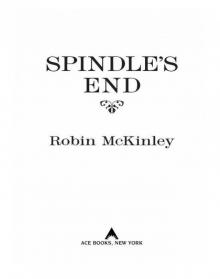 Spindle's End
Spindle's End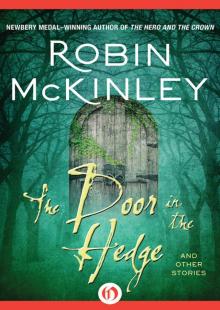 The Door in the Hedge: And Other Stories
The Door in the Hedge: And Other Stories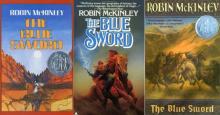 The Blue Sword
The Blue Sword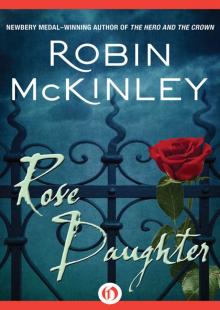 Rose Daughter
Rose Daughter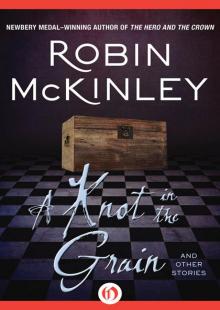 A Knot in the Grain and Other Stories
A Knot in the Grain and Other Stories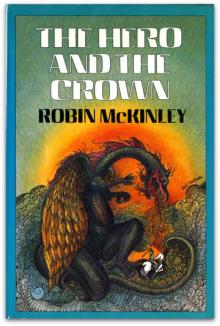 The Hero And The Crown
The Hero And The Crown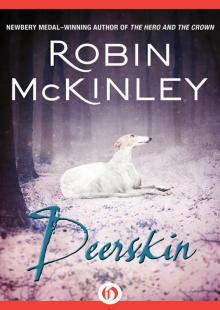 Deerskin
Deerskin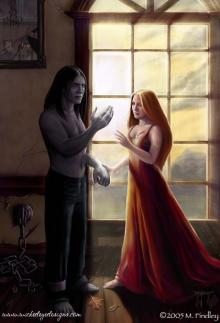 Sunshine
Sunshine Beauty: A Retelling of the Story of Beauty and the Beast
Beauty: A Retelling of the Story of Beauty and the Beast Shadows
Shadows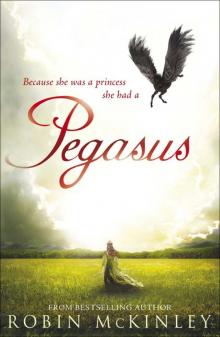 Pegasus
Pegasus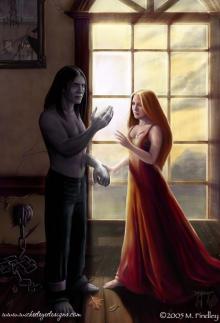 Chalice
Chalice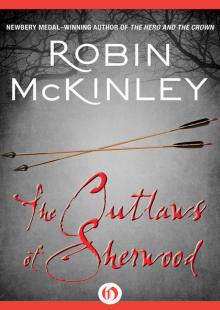 The Outlaws of Sherwood
The Outlaws of Sherwood Fire: Tales of Elemental Spirits
Fire: Tales of Elemental Spirits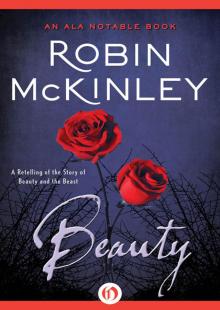 Beauty
Beauty Dragon Haven
Dragon Haven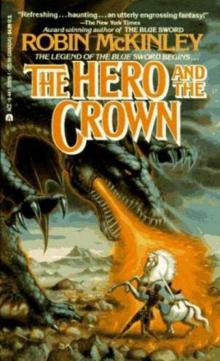 The Hero And The Crown d-2
The Hero And The Crown d-2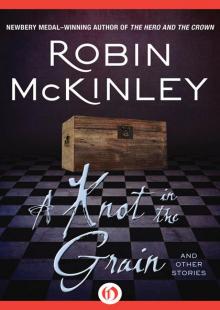 A Knot in the Grain
A Knot in the Grain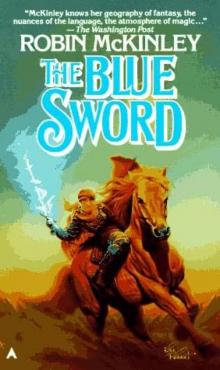 The Blue Sword d-1
The Blue Sword d-1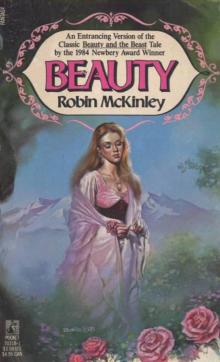 Beauty (v1.2)
Beauty (v1.2)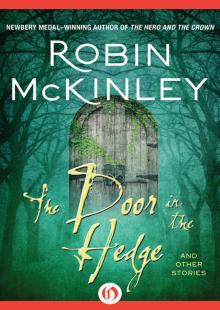 The Door in the Hedge
The Door in the Hedge